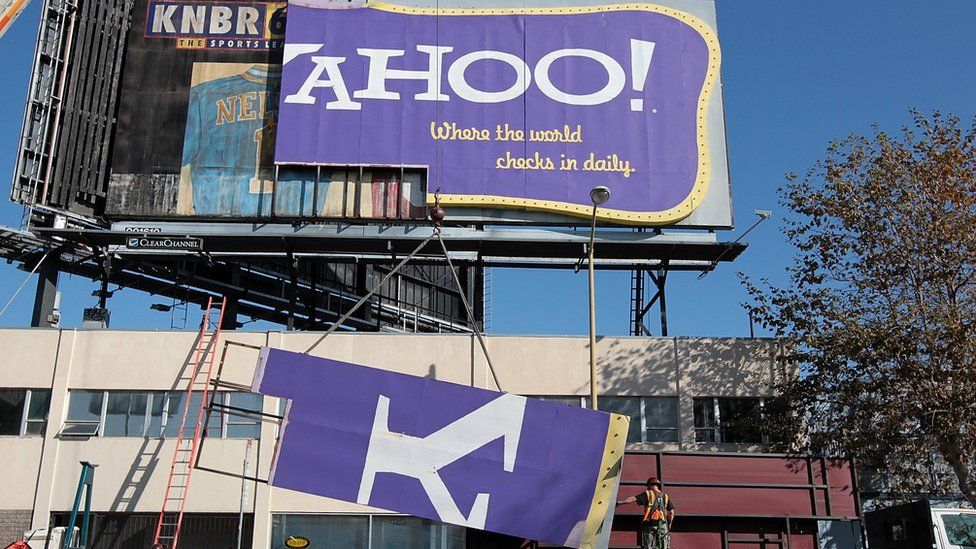The end of Yahoo: Why Verizon spent big
- Published
- comments

Yahoo was the first website I ever visited. My Dad took me and my brother to an internet cafe in central London, and there it was - an exciting portal to the world wide web. Without it we'd have been completely lost.
That hand-holding portal was at one point worth a staggering $125bn. Today, it was sold for $4.83bn (£3.7bn) to US mobile network Verizon.
That's a remarkable amount of money for a company whose name has become shorthand for online businesses falling from grace. Last quarter, Yahoo lost $440m. It may have made its name by helping us make sense of the web, but it's long been clear that other companies do that job far better, and make much more money doing it.
But Verizon won't care about that. They want eyeballs. Bums on seats. People through the door… and on that measure, Yahoo delivers. Collectively, around a billion people flow through Yahoo's sprawl of web properties at least once a month.
Verizon is now likely to merge Yahoo with AOL, the company it bought last year for $4.4bn. A Yahoo-AOL pairing has been expected for years. The companies are like two high school friends who everyone knew would eventually get together, but only when the time was right. Or maybe when they were both a bit desperate.
Anyway, Verizon's strategy in marrying the companies is to create a massive content network of well-respected web properties. Sites like Huffington Post, Engadget, Yahoo Finance and TechCrunch will now all deliver advertising for Verizon, advertising that can be more effectively targeted given what Verizon knows about its mobile customers.
It will help Verizon compete with Google and Facebook, who are way out in front when it comes to market domination of online advertising.
But such is the size of the industry, being in third place would be extremely lucrative for Verizon. That's what this deal is all about, and that's why Yahoo commanded such a big price tag even though it has dropped off most people's radars in recent years.
Yahoo couldn't do it alone - it simply doesn't have enough data on its one billion or so monthly users to target and personalise ads in the way Google and Facebook can.
More Mayer
The deal has concluded a four-month selling process that caught the attention of many interested parties, including rival phone network AT&T and, to many people's surprise, the Daily Mail.
Many expected the deal to see Marissa Mayer's rollercoaster tenure as Yahoo's boss come to an end.
She could have reportedly taken a $55m severance payment, but even that extremely pleasant send off did not tempt her to leave a company that she declared her love for in an email detailing the deal.
But there's no doubt she'll be wishing her time at Yahoo had been a more successful one.
It was a rocky road - her appointment in 2012 was enthusiastically welcomed, not only due to her formidable past at Google, but also as her ability to act as a flag-bearer for women running big companies in Silicon Valley.
For that reason, her time at Yahoo may have had added scrutiny, but her time at the company has been unquestionably disappointing on many levels. Big acquisitions - like Tumblr, for $1bn - simply didn't bring in enough extra revenue. And the site's big gamble in trying to become a news organisation never hit the level of success Mayer presumably envisioned.
Even with the help of the highly-respected US anchor Katie Couric, and scooping of "traditional" media big names such as David Pogue from the New York Times, the amount of traffic going to Yahoo's original content hasn't come close to justifying the cost of bringing in the big talent.
Responsibility for that lies squarely at Mayer's feet, and it all led to the bizarre situation where she was working hard to put herself out of a job by pushing through Yahoo's sale.
On this final task, she'll will perhaps be commended. It's not often a major tech acquisition takes place so publicly, with boardroom discussions seeping out of the walls and into the press regularly. But it seems the process was effective in pushing up Yahoo's share price and moving Verizon to pay an extra $1.8bn on its opening bid.
We'll hear more concrete details from Verizon in due course. It may keep using the highly recognisable Yahoo brand, it may not.
Regardless, Yahoo as a company is finished - and everybody saw it coming.
Follow Dave Lee on Twitter @DaveLeeBBC and on Facebook
- Published25 July 2016
- Published15 May 2016